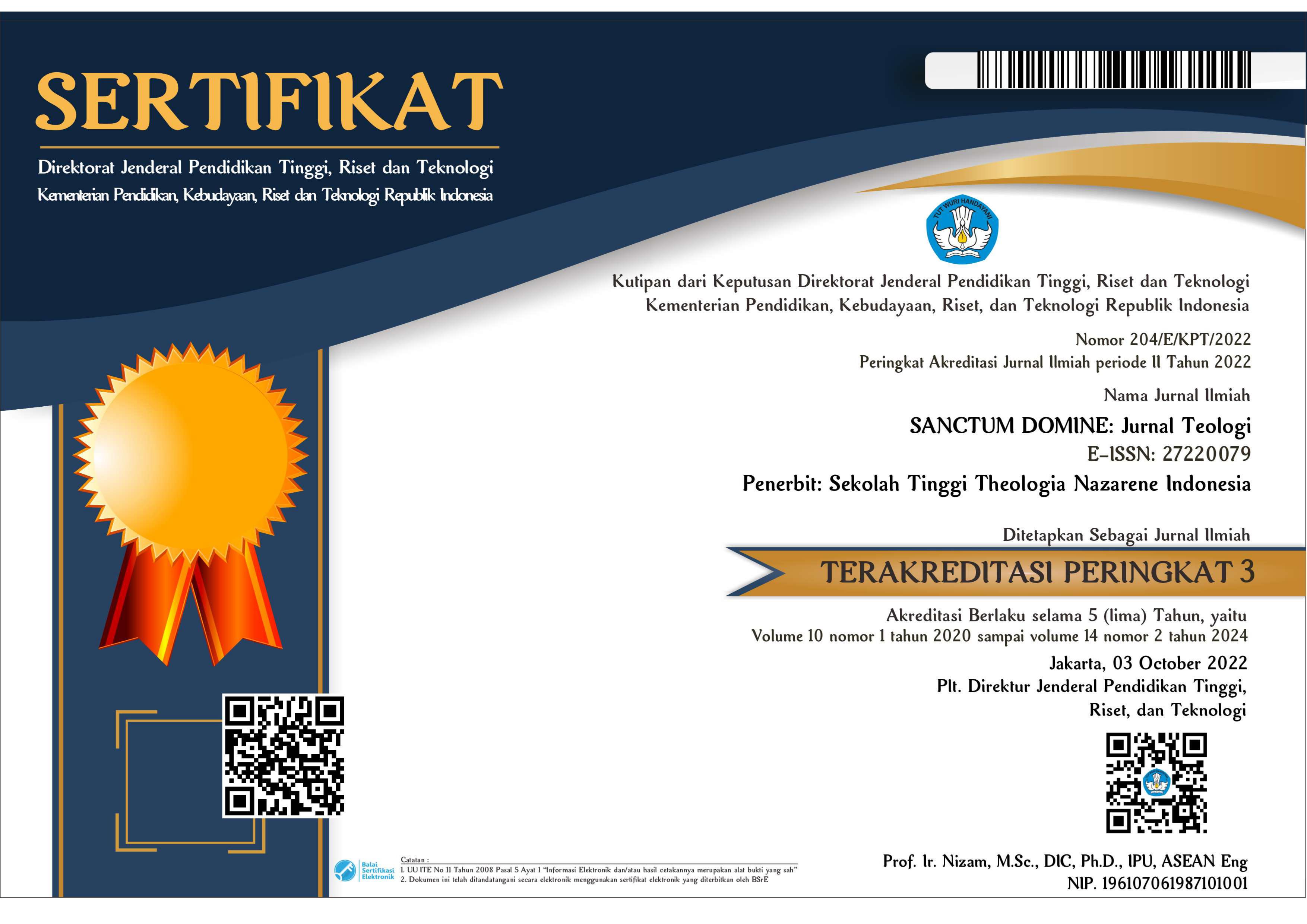Pseudo Problems in Christian Theology
T. F. Torrance’s View of Space as a Case Study
Abstract
As a scientific theologian, Thomas F. Torrance advocated for an objective approach to theologizing. He was weary of approaching the contents of divine revelation out of a center in philosophy, culture, or the self. For him, an imposition to theology from without creates problems to theological content. This article focuses on his analysis of the Greek understanding of space that became the underlying—and unspoken—presupposition of early heretics that led them to advocate Christological profanity. Using qualitative content analysis as research design, the article scoured through Torrance’s own writings and secondary literature to present Torrance’s critique of philosophical theology and his own theological alternative. Greater emphasis, however, was given to primary sources so that Torrance’s own position is faithfully presented. The study is sympathetic to Torrance’s proposal that Christian theology may avoid doctrinal and theological problems if theologians interpret divine realities kata physin. Using the concept of space as an illustration, both in the past and the present, if both biblical and theological scholarships operate within cultural-philosophical categories and not from a center in the Gospel datum taken at face value, problems that are not supposed to be there surface. Theologizing becomes circularly self-collapsing once prevailing popular and cultural worldviews are uncritically assimilated and accepted.
References
Bauman, Michael. “Thomas F. Torrance.” In Roundtable: Discussions with European Theologians, edited by Michael Bauman, 109-18. Grand Rapids: Baker Book House, 1990.
Bengtsson, Mariette. “How to Plan and Perform a Qualitative Study Using Content Analysis.” NursingPlus Open 2 (2016): 8-14.
Braaten, C.E., and E. W. Jenson. Christian Dogmatics. Philadelphia: Fortress Press, 1984.
Deddo, Gary W. “Resisting Reductionism: Why We Need a Truly Theological Anthropology to Counter the Dehumanization of God’s Humanity.” Participatio 9 (2021): 95-128.
Dillern, T. “The Act of Knowing: Michael Polanyi Meets Contemporary Natural Science.” Foundations of Science 25 (2020): 573-585.
Drisko, James W., and Tina Maschi. Content Analysis. Oxford: Oxford U. Press, 2016.
Flett, Eric, Andrew Picard, and Myk Habets. “Christ and Culture: Toward a Contextual Theology.” In Evangelical Calvinists, vol. 2, Dogmatics and Devotion. Edited by Myk Habets and Bobby Grow, 221-240. Eugene, OR: Pickwick, 2017.
Gimple, R. “Contact with Reality: Michael Polanyi’s Realism and Why It Matters.” Evangelical Quarterly: An International Review of Bible and Theology 92 (2021): 92-94.
Graneheim, Ulla H., Britt-Marie Lindgren, and Berit Lundman. “Methodological Challenges in Qualitative Content Analysis: A Discussion Paper.” Nurse Education Today 56 (2017): 29-34.
Green, M. The Truth of God Incarnate. Grand Rapids: Eerdmans, 1977.
Goulder, M. D. Incarnation and Myth: The Debate Continued. Grand Rapids: Eerdmans, 1977.
Haack, S. “Personal or Impersonal Knowledge?” Journal of Philosophical Investigations 13 (2019). Available at SSRN: https://ssrn.com/abstract=3503068.
Heron, Alasdair I. C. A Century of Protestant Theology. Reprint. Cambridge: Lutterworth, 1985.
Hesselink, John I. “A Pilgrimage in the School of Faith: An Interview with T. F. Torrance.” Reformed Review 38 (1984): 49-64.
Hick, John. Editor. The Myth of God Incarnate. London: SCM, 1977.
Holder, Rodney D. “Thomas Torrance: Science, Theology, and the Contingent Universe.” Participatio 7 (2017): 27-48.
Irving, Alexander J. D. “What Does Athens Have to Do with Edinburgh? Can an Immanent-Realist View of Universals Help Us Understand T. F. Torrance’s Conception of Reality?” Participatio 7 (2017): 71-98.
Lee, Sang Hoon. “The Doctrine of Divine Simplicity in T. F. Torrance’s Theology.” International Journal of Systematic Theology 23 (2021): 198-214.
Lindbeck, George. The Nature of Doctrine: Religion and Theology in a Postliberal Age. Louisville: Westminster John Knox, 2009.
Mayring, Philipp. Qualitative Content Analysis: Theoretical Foundation, Basic Procedures and Software Solutions. Austria: Klagenfurt, 2014.
McGrath, Alister. “Place, History, and Incarnation: On the Subjective Aspects of Christology.” Scottish Journal of Theology 75 (2022): 137-147
Muis, Jan. “Our Spatial Reality and God.” HTS Teologiese Studies 77 (2021). https://doi. org/10.4102/hts.v77i3.6890.
Seitz, Christopher. Editor. Nicene Christianity: The Future of a New Ecumenism. Grand Rapids: Brazos Press, 2001.
Skarsaune, Oskar. Incarnation: Myth or Fact? St. Louis, MO: Concordia Publishing House, 1991.
Stevick, Travis M. “The Function of Scientific Theology in the Thought of T. F. Torrance.” Participatio 7 (2017): 47-70.
Torrance, Thomas F. Atonement: Person and Work of Christ. Edited by Robert T. Walker. Milton Keynes: Paternoster, 2009.
________. The Christian Doctrine of God: One Being Three Persons. Edinburgh: T&T Clark, 1996.
________. The Christian Frame of Mind. Edinburgh: Handsel, 1985.
________. Christian Theology and Scientific Culture. Belfast: Christian Journals, 1980.
________. Divine and Contingent Order. Reprint. Edinburgh: T&T Clark, 1998.
________. Divine Meaning: Studies in Patristic Hermeneutics. Edinburgh: T&T Clark, 1995.
________. “Ecumenism and Rome.” Scottish Journal of Theology 37 (1984): 59-64
________. God and Rationality. Reprint. Edinburgh: T&T Clark, 1997.
________. The Ground and Grammar of Theology. Charlottesville, VA: The U. Press of Virginia, 1981.
________. Editor. The Incarnation: Ecumenical Studies in the Nicene-Constantinopolitan Creed AD 381. Edinburgh: Handsel Press, 1981.
________. Karl Barth: Biblical and Evangelical Theologian. Edinburgh: T&T Clark, 1990.
________. Preaching Christ Today: The Gospel and Scientific Thinking. Grand Rapids: Eerdmans, 1994.
________. Reality and Evangelical Theology. Philadelphia: Westminster Press, 1982.
________. Reality and Scientific Theology. Edinburgh: Scottish Academic Press, 1986.
________. Space, Time, and Incarnation. Reprint. Edinburgh: T&T Clark, 1997.
________. Space, Time, and Resurrection. Grand Rapids: Eerdmans, 1976.
________. Theological Science. Oxford: Oxford U. Press, 1969.
________. Theology in Reconciliation: Essays Towards Evangelical and Catholic Unity in East and West. Reprint. Eugene, OR: Wipf & Stock, 1997.
________. Theology in Reconstruction. Grand Rapids: Eerdmans, 1965.
________. Transformation & Convergence in the Frame of Knowledge. Grand Rapids: Eerdmans, 1984.
________. The Trinitarian Faith: The Evangelical Theology of the Ancient Catholic Church. Edinburgh: T&T Clark, 1995.
________. Trinitarian Perspectives: Toward Doctrinal Agreement. Edinburgh: T&T Clark, 1994.
Copyright (c) 2023 SANCTUM DOMINE: JURNAL TEOLOGI

This work is licensed under a Creative Commons Attribution-NonCommercial-ShareAlike 4.0 International License.
Copyright:
SANCTUM DOMINE: Jurnal Teologi will validate, produce, disseminate, and act as steward in the long-term curation of every article published. In order to achieve this, the author typically requires a transfer or “assignment” of the copyright in the article. As is the case for open access publishing, the author (or copyright owner of the article, if different) signs an author publishing agreement. The agreement incorporates the necessary transfer of copyright.
After assigning copyright, the author will still retain the right to:
- Be credited as the author of the article.
- Own and exercise any trademark or patent rights held by author and addressed in the article.
- Make printed copies of the article to use for a lecture or class that the author leading on a non-commercial basis.
- Share the article with friends, colleagues and influential people the author would like to read the work.
- Present the article at a meeting or conference and distribute printed copies of the article on a non-commercial basis.
License:
This work is licensed under a Creative Commons Attribution-NonCommercial-ShareAlike 4.0 International License.
You are free to:
- Share — copy and redistribute the material in any medium or format
- Adapt — remix, transform, and build upon the material
- The licensor cannot revoke these freedoms as long as you follow the license terms.
Under the following terms:
- Attribution — You must give appropriate credit , provide a link to the license, and indicate if changes were made . You may do so in any reasonable manner, but not in any way that suggests the licensor endorses you or your use.
- NonCommercial — You may not use the material for commercial purposes .
- ShareAlike — If you remix, transform, or build upon the material, you must distribute your contributions under the same license as the original.
- No additional restrictions — You may not apply legal terms or technological measures that legally restrict others from doing anything the license permits.
Notices:
You do not have to comply with the license for elements of the material in the public domain or where your use is permitted by an applicable exception or limitation .
No warranties are given. The license may not give you all of the permissions necessary for your intended use. For example, other rights such as publicity, privacy, or moral rights may limit how you use the material.



8.png)









